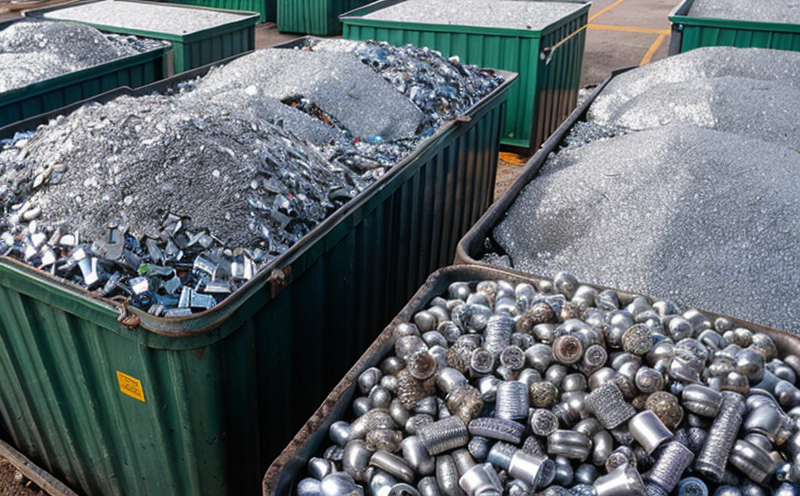ASTM E127 Bismuth in Recycled Alloys
The ASTM E127 standard is a critical tool used to ensure that recycled alloys meet the stringent quality requirements for their intended applications. This service focuses on detecting and quantifying bismuth in recycled alloys, which can significantly impact material properties and performance.
Bismuth is often introduced into metallic systems during recycling processes through various sources such as brass or bronze components. Its presence can lead to issues like embrittlement, especially when the concentration exceeds certain thresholds. The ASTM E127 method provides a reliable means of assessing bismuth contamination levels in recycled metals.
In industries reliant on high-performance alloys, such as aerospace, automotive, and electronics, ensuring that bismuth does not exceed permissible limits is paramount for maintaining product integrity and safety. By adhering to this standard, laboratories can provide clients with accurate data regarding the presence of bismuth, thereby supporting informed decision-making processes.
The ASTM E127 procedure involves several key steps including sample preparation, dissolution, and subsequent analysis using inductively coupled plasma optical emission spectrometry (ICP-OES). This advanced analytical technique allows for precise measurement of trace elements like bismuth down to parts per million levels. The resulting data helps determine whether recycled alloys comply with specified limits set forth by industry standards.
Our expertise lies not only in performing these analyses but also interpreting the results within broader regulatory frameworks applicable to various sectors. From ensuring compliance with international standards such as ISO 9001 for quality management systems to meeting specific requirements outlined in EN 45018 for forensic laboratories, we offer comprehensive support tailored specifically towards your organization's needs.
By leveraging our state-of-the-art facilities and experienced technical staff, we can deliver accurate, reliable results that meet or exceed customer expectations. Whether you require routine testing or one-off assessments, rest assured knowing that every aspect of this process is conducted under strict quality control measures designed to produce consistent outcomes.
Applied Standards
The ASTM E127 standard specifies the procedure for determining bismuth in recycled alloys. This includes detailed instructions on sample preparation, dissolution techniques, and analytical methods suitable for detecting trace amounts of this element. The method relies heavily on ICP-OES technology due to its sensitivity and precision capabilities.
For those involved in recycling processes or dealing with end-of-life products containing bismuth-bearing materials, understanding how ASTM E127 applies is essential. Compliance with these guidelines ensures that recycled materials remain consistent with original specifications while minimizing risks associated with excessive bismuth content.
The standard also covers considerations related to sample preparation, such as ensuring representative samples are taken from the batch being analyzed. Additionally, it emphasizes the importance of maintaining accurate records throughout all stages of analysis, which helps maintain traceability and accountability within your organization.
Quality and Reliability Assurance
We understand that trust in analytical results is crucial for decision-making processes across industries. That's why we employ rigorous quality assurance practices at every stage of our testing procedures to ensure reliability and accuracy. Our commitment extends beyond mere compliance; it encompasses continuous improvement through ongoing calibration checks, method validation exercises, and participation in proficiency testing programs recognized worldwide.
Our quality management systems are certified ISO 9001:2015, ensuring consistent delivery of high-quality services across all projects. By adhering to these stringent standards, we guarantee that each test result meets or exceeds industry expectations. Furthermore, our experienced technical team remains up-to-date with the latest advancements in analytical techniques and methodologies, allowing us to stay ahead in delivering cutting-edge solutions.
In addition to internal controls, we also participate in external proficiency testing schemes organized by organizations like National Institute of Standards and Technology (NIST) or European Cooperation for Accreditation (EA). These independent assessments provide objective evidence validating our capabilities and reinforce confidence among clients.
International Acceptance and Recognition
The ASTM E127 standard has gained widespread acceptance in numerous countries around the globe. Its robust methodology and clear guidelines make it a preferred choice for laboratories seeking to accurately quantify bismuth in recycled alloys. Many global regulatory bodies, including those from Europe (EN), Asia (JIS), North America (ASTM), and elsewhere, recognize this standard as authoritative.
By adopting ASTM E127, organizations can ensure their testing methods align with international best practices, fostering trust among stakeholders worldwide. This harmonization of standards facilitates smoother trade between countries, reduces barriers to market entry for compliant products, and promotes consistent quality across supply chains.
The growing adoption of this standard reflects its value in addressing global challenges related to recycling and resource efficiency. As more industries embrace circular economy principles, there is increasing demand for accurate methods that can verify the integrity of recycled materials entering new production cycles.





